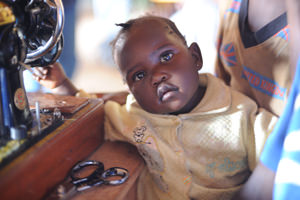Good News for Pregnant Women in Republic of Congo
Although more than half of the women in the world who die during childbirth perish in sub-Saharan Africa, the Republic of Congo’s government has efficiently allotted funds toward improving infant delivery conditions. The results have been a 50 percent decrease in maternal deaths in the past 10 years.
Although more than half of the women in the world who die during childbirth perish in sub-Saharan Africa, the Republic of Congo’s government has efficiently allotted funds toward improving infant delivery conditions. The results have been a 50 percent decrease in maternal deaths in the past 10 years, thanks to well-equipped facilities and trained staff. But there’s another very important development in Congolese hospitals: free cesareans.
C-sections used to cost $500 or more, and as one woman recalls, “If you don’t have the money, you have to find it. Or you will die there, on the table.” All that changed in 2011 when a presidential decree increased access to cesareans in an effort to reduce maternal mortality by making the process free of cost. And yet, while conditions have significantly improved for women in labor in Brazzaville, the capital, other parts of the country are still lacking hospitals and doctors. Al-Jazeera explains how the republic’s health care progress, though significant, is incomplete:
To be sure, there’s more to be done for expectant mothers here, and health officials aren’t shy about saying so. These days, nearly 95 percent of women pay for a pre-natal checkup, but 15 percent of them don’t show up again – a rate of attrition even higher than in 2005, during darker days for maternal mortality. Each visit, Dr. Puruehnce explains, “requires money. That’s money that can go to feed a family, or go directly to [paying for] the birth.”
“It would be great if these services could be free for everyone,” she adds – and as his health advisor, she in particular has the president’s ear. But she acknowledges that this is unlikely to happen. “Realistically, if we could get the price down to 2,000-3,000 [CFA, or $4 to $6], that would be good.”
And there are, in fact, rural women – including the comparatively disenfranchised indigenous community – birthing largely outside the reach of health infrastructure, referrals and trained personnel. “In the rural areas, they give birth traditionally, in the home, with a matron,” an untrained traditional birth attendant, according to Clémence Otilibili, treasurer of the National Association of Midwives. “In some parts of the bush, it’s archaic. When they need to weigh the baby, they put it in a wrap and rest it on the same scale they use for meat.” And even in urban areas, Otilibili says, there are still training and personnel needs outside of the major referral hospitals….
Meanwhile, experts and activists say, not all maternal health comes down to what happens in the delivery room. Improving access to – and the acceptability of – family planning is another key goal. “They’re directly linked,” says Zéphirin Abel Moukolo, the director of programming for the Association for the Well-Being of Congolese Families, a partner in many governmental health initiatives and a local affiliate of the International Planned Parenthood Federation. “How to keep women under 18 from falling pregnant?” he asks, intoning the physical dangers of premature pregnancy. “It’s family planning.”
Family planning still runs up against social taboos, which affect the well-being of more than pregnant mothers. “We see reproductive health as a question of sexuality. In our country there are so many taboos on [discussing] sexuality,” she says. “But what else is HIV/AIDS prevention but a question of sexuality, of sexual health? Same with youth…same with family planning.”
All these factors are taken into account as the nation tries to reform its health care infrastructure to benefit women, but poverty creates more obstacles. Although the republic is considered a middle-income African country, a large disparity between classes unfortunately persists.
—Posted by Natasha Hakimi
Your support matters…Independent journalism is under threat and overshadowed by heavily funded mainstream media.
You can help level the playing field. Become a member.
Your tax-deductible contribution keeps us digging beneath the headlines to give you thought-provoking, investigative reporting and analysis that unearths what's really happening- without compromise.
Give today to support our courageous, independent journalists.






You need to be a supporter to comment.
There are currently no responses to this article.
Be the first to respond.